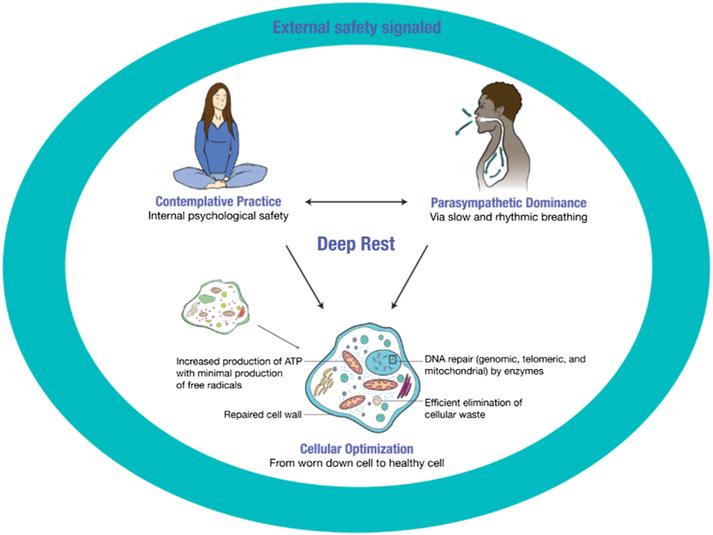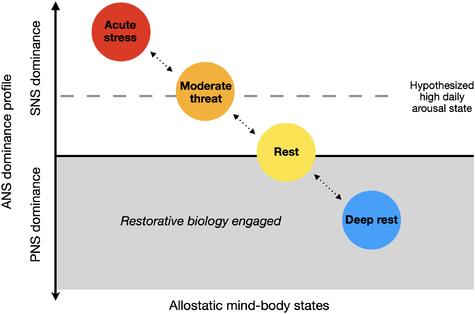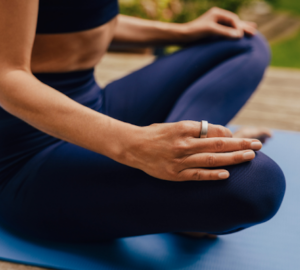Did you know it may be possible to get “deep rest” and be “productive” at the same time?
That’s what Oura advisor Elissa Epel, PhD, found in recently published research in Psychological Review. Epel and a group of researchers developed an integrative model that looked at the “special and too-rare psychophysiological state,” referred to as deep rest.
“My colleague, Dr. Alexandra Crosswell, led this project to address the fundamental question of why and how contemplative practices of all kinds can lead to very similar effects of rejuvenation on mind and body,” Epel explains. “For example: What are the common foundational elements underlying practices such as prayer, meditation, and yoga?”
Their findings point to deep rest as an effective way to combat the high levels of stress many people face in their daily lives. “With our deep rest state research, we hope to better understand how to combat stress and rejuvenate our cells, as well as how to measure both strong and subtle stress states and deeply restorative states,” Epel says.
The Cost of Stress
Due to stressful daily lives, many people experience persistent sympathetic nervous system dominance. Intentional habits that help you shift to a parasympathetic-dominant state, or a deep rest state, help balance this out.
“Experiencing high levels of psychological stress is incredibly energetically depleting — a physiological cost that over time can accelerate cellular aging,” says Epel. “Deep rest is the opposite: It’s a state that allows for rejuvenation at a cellular level, and unfortunately, most people only get this benefit during the deepest stages of sleep.”
| Member Tip: Track your physiological stress levels during the day using the Daytime Stress feature. Monitor how well you balance out your stress with adequate recovery over time using the Resilience feature. |
Deep Rest: A Remedy for Stress?
“For the last several years, Epel and I have worked on a new integrative model of how our bodies respond to stress,” lead study author Alexandra Crosswell, PhD wrote on LinkedIn. “In this paper, we propose a way to counteract the intense levels of stress in modern life: by spending time in ‘deep rest.’”
While deep sleep is one way to achieve a deep-rest state, you can also achieve deep rest in mind-body practices like yoga, breathing exercises, spending time in nature, and meditation, researchers say.
Deep rest signals that you are safe and helps to replenish cellular energy. Incorporating techniques like rhythmic deep breathing and contemplation can also help signal psychological and physiological safety.
And it’s not only beneficial at the moment of stress: “Experiencing more deep rest states is an effective, preventative health measure that has important health benefits over the long term,” Epel notes.

READ MORE: What Is Non-Sleep Deep Rest (NSDR)?
Key Benefits of Deep Rest
- Deep rest can promote “exceptional states of emotional well-being.” The daily practice of deep rest may help to prevent depression and anxiety and promote enhanced emotional well-being.
- Deep rest is a preventative health measure. Deep rest counteracts the damage caused by chronic stress at a cellular level. “Our model proposes that deep rest allows energy to be allocated toward cellular restoration processes instead of maintaining heightened threat arousal — optimizing biological and physiological functions,” says Crosswell.
- Deep rest improves physical health markers. Deep rest can lower blood pressure and systemic inflammation, improve metabolic efficiency, and improve age-related biomarkers such as telomere length.
- Deep rest doesn’t need to take a lot of time. A brief deep rest is better than no deep rest, researchers note. “We found that our cells are extremely responsive to even short experiences of deep rest,” Epel notes.

Deep Rest: What’s Next?
“We hope that the research on deep rest and cellular restoration helps people see how responsive our cells are to even short experiences of deep rest and ignites people’s commitment to making mind-body practices a core part of their everyday life,” Epel says.
“It’s exciting that Oura offers new tools, like the Daytime Stress feature, which allow people to examine their own bodily arousal states and take action when necessary,” she adds. “We know when we feel emotionally stressed, but we often don’t know when our body feels stressed. This is a precious new channel of information that allows us to regulate our nervous system better. It can help people discover personal insights, develop awareness of when they need a break, and ultimately take better control of their whole-body well-being.”
RELATED: Health Benefits of Journaling – and How to Make it a Habit!




